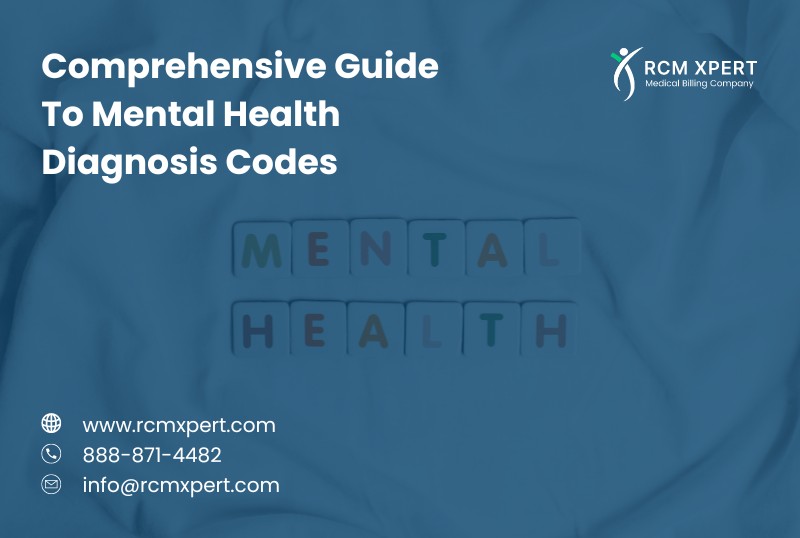Mental health diagnosis codes are essential tools in clinical and administrative aspects of healthcare. These codes are helpful for practitioners to record diagnoses for patients. These codes facilitate clear communication among healthcare providers, insurance companies, and others, involved in the specific mental health challenges of patient care.
Proper use of mental health diagnosis codes helps in submitting accurate insurance claims, which reduces delays and denials from insurance companies. For patients, these codes impact the coverage of their treatment costs and the management of their treatment plans.
This article will provide a comprehensive overview of mental health diagnosis codes, including their definitions and applications, and will offer resources for further learning and implementation.
What Are Mental Health Diagnosis Codes?
Mental health diagnosis codes are critical tools healthcare professionals use to properly document and communicate patient diagnoses. These codes are essential for billing purposes, ensuring that healthcare providers are reimbursed for their services by insurance companies.
The Role of the DSM-5 and ICD-10
The Diagnostic and Statistical Manual of Mental Disorders, Fifth Edition (DSM-5), and the International Classification of Diseases, Tenth Revision (ICD-10), are the primary systems, used for coding mental health conditions. The DSM-5 is utilized primarily in the United States for psychiatric diagnoses and aligns closely with the ICD-10, which is used both domestically and internationally. These coding systems facilitate a common language among mental health professionals, which helps in the following ways:
- Ensuring Consistency: They standardize the criteria for mental health diagnoses, promoting consistency in treatment across different practitioners and locations.
- Enhancing Communication: They improve communication among mental health professionals, insurers, and researchers, contributing to more effective patient management and care coordination.
Benefits of Standardized Codes for Mental Health
Standardized diagnosis codes bring several benefits to mental health practice, including:
- Improved Treatment Outcomes: By accurately coding the diagnosis, practitioners can better tailor appropriate treatment plans for their patients, potentially leading to improved outcomes.
- Streamlined Billing Processes: Accurate use of diagnosis codes simplifies the billing process, reduces errors, and helps ensure timely payment from insurers.
- Enhanced Research and Reporting: These codes allow for more effective data collection and analysis, which is vital for research and improving the overall quality of mental health services.
Table of Most Common Mental Health Diagnosis Codes
| ICD-10 Code | Description | Category |
| F32.9 | Major Depressive Disorder, Single Episode, Unspecified | Mood Disorders |
| F33.1 | Major Depressive Disorder, Recurrent, Moderate | Mood Disorders |
| F41.1 | Generalized Anxiety Disorder Anxiety | Anxiety Disorders |
| F40.10 | Social Anxiety Disorder (Social Phobia), Unspecified | Anxiety Disorders |
| F31.9 | F31.9 Bipolar Disorder, Unspecified | Bipolar and Related Disorders |
| F31.5 | Bipolar I Disorder, Current Episode Depressed | Bipolar and Related Disorders |
| F20.9 | Schizophrenia, Unspecified | Schizophrenia Spectrum and Other Psychotic Disorders |
| F60.3 | F60.3 Borderline Personality Disorder | Personality Disorders |
| F84.0 | Autistic Spectrum Disorder | Neurodevelopmental Disorders |
| F90.9 | Attention-Deficit Hyperactivity Disorder, Unspecified | Neurodevelopmental Disorders |
| f43.1 | Post-Traumatic Stress Disorder (PTSD) | Trauma- and Stressor-Related Disorders |
| F43.22 | Adjustment Disorders | Trauma- and Stressor-Related Disorders |
Types of Mental Health Diagnosis Codes
Mental health diagnosis codes categorize a wide range of mental health conditions, facilitating accurate documentation, billing, and standardized communication among healthcare providers. These codes are crucial for ensuring that patients receive the appropriate care tailored to their specific needs.
Understanding Major Categories
Mental health diagnosis codes are primarily derived from the ICD-10 and the DSM-5, two systems that classify mental health disorders into various categories. Major categories include:
- Mood Disorders (e.g., Depression, Bipolar Disorder): These codes help in identifying the specific type of mood disorder, assisting in targeted treatment strategies.
- Anxiety Disorders (e.g., Generalized Anxiety Disorder, Panic Disorder): Coding these conditions accurately ensures that patients receive therapies suited to the intensity and nature of their anxiety.
- Psychotic Disorders (e.g., Schizophrenia): These codes are used to specify complex disorders, which are critical for arranging appropriate long-term care and support.
Specificity of Codes and Subtypes
Each mental health condition is coded with a level of specificity that captures the variations of the patient’s diagnosis. This specificity includes:
Subtypes: Many disorders, such as Bipolar Disorder, have subtypes that describe the pattern of symptoms (e.g., Bipolar I vs. Bipolar II).
Severity: Codes often indicate the severity of the disorder, which can influence treatment decisions and insurance coverage.
Episode Details: For disorders with episodic manifestations, codes can denote whether the current episode is mild, moderate, or severe.
Finding Your Diagnosis Code on Medical Records
For patients and healthcare providers, locating the correct mental health diagnosis code on medical records is essential for several reasons:
- Ensuring Accurate Billing: Proper coding is crucial for insurance claims and avoiding denials based on coding errors.
- Tracking Treatment Progress: Diagnosis codes on medical records help in monitoring the effectiveness of treatment plans over time.
- Facilitating Referrals and Second Opinions: When consulting with specialists or seeking a second opinion, having precise diagnosis codes readily available streamlines the process.
Why Are Mental Health Diagnosis Codes Important?
Mental health diagnosis codes are crucial for effective treatment and administrative accuracy in healthcare settings. These codes not only facilitate appropriate treatment planning but also ensure that mental health professionals and facilities receive appropriate compensation from insurance providers.
Treatment Planning and Insurance Coverage
Effective Treatment Matching: Mental health diagnosis codes help healthcare providers identify and apply the most effective treatment plans for specific conditions. By using these codes, practitioners can access treatments and patient history, ensuring continuity and consistency of care.
Insurance Claims Processing: Accurate diagnosis codes are essential for processing insurance claims. They enable:
- Clear Communication: Ensures that insurance providers understand the medical necessity of the treatments provided.
- Appropriate Reimbursement: Helps healthcare providers receive timely and accurate reimbursements for the services rendered to patients.
Tracking Mental Health Trends and Research
Mental health diagnosis codes are essential for tracking disease common and outcomes, facilitating essential research that informs public health policies and treatment strategies.
Data Collection and Analysis: Mental health diagnosis codes play a significant role in the collection of epidemiological data, helping researchers identify patterns and trends in mental health conditions.
- Public Health Decisions: This data is crucial for making informed decisions about public health strategies and resource allocation.
- Advancing Treatment Methods: Ongoing research using these aggregated data leads to advancements in treatment methodologies and understanding of mental health disorders.
Beyond the Code: What Your Diagnosis Doesn’t Tell You
Mental health diagnosis codes are critical for clinical documentation and insurance billing, but they often do not capture the full scope of an individual’s experience.
Individuality of Experiences
Each person’s journey with mental health is unique, and while mental health diagnosis codes provide a framework for identifying and treating mental disorders, they can’t fully encompass the personal experiences and challenges that patients face. These codes often:
- Overlook Personal Factors: Such as individual coping mechanisms and personal history, which can significantly influence mental health and recovery.
- Limit Treatment Approaches: Relying strictly on diagnosis codes may restrict the treatment options to those predefined for specific conditions, potentially overlooking better-suited personalized interventions.
Importance of a Holistic Approach to Mental Health
A holistic approach to mental health care considers the entire person, not just the symptoms or diagnosis codes. This approach benefits patients by:
- Integrating Various Treatment Modalities: Combining psychological, physical, and social aspects of health to provide comprehensive care that addresses all factors influencing mental health.
- Emphasizing Patient-Centered Care: Focusing on patients’ preferences, needs, and values, and respecting their experiences and feelings as part of the care process.
Frequently Asked Questions About Mental Health Diagnosis Codes
Mental health diagnosis codes are essential in the healthcare sector for billing and treatment accuracy, yet they can often be confusing. This section addresses common questions to clarify their use and significance, helping both individuals diagnosed with mental health conditions and professionals navigate the complexities of these codes.
Can I Access My Diagnosis Code?
Yes, you can access your diagnosis code. It is your right under the Health Insurance Portability and Accountability Act (HIPAA) to access your medical records, which include your diagnosis codes. Here’s how you can access them:
- Requesting Records: You can request a copy of your medical records from your healthcare provider’s office or the health facility where you received treatment.
- Electronic Health Records: If your healthcare provider uses electronic health records, you may be able to view your diagnosis codes online through a patient portal.
What if I Disagree With My Diagnosis?
If you disagree with your diagnosis, you have options to address your concerns:
- Discuss with Your Provider: The first step is to discuss your concerns directly with your healthcare provider. They can explain the basis for the diagnosis and consider your input, which might lead to a re-evaluation.
- Seek a Second Opinion: You are entitled to seek a second opinion from another mental health professional. This can provide a fresh perspective on your symptoms and possibly lead to a different diagnosis.
Where Can I Learn More About Specific Codes?
To learn more about specific mental health diagnosis codes, you can use several resources:
- ICD-10 Online Tools: Websites like the WHO’s ICD-10 online browser allow you to search and read about specific mental health codes.
- Professional Healthcare Providers: Consulting with healthcare providers, especially those specializing in mental health, can offer detailed explanations and context for diagnosis codes.
- Medical Coding Resources: Books, courses, and online materials on medical coding also provide insights into mental health diagnosis codes and their applications.
Conclusion
Mental health diagnosis codes are essential for effective treatment and understanding of mental health disorders. These standardized codes ensure consistent and comprehensive care by accurately documenting and communicating mental health conditions. They also support research, helping to improve treatments and inform policy development. For both patients and providers, understanding and using these codes correctly is key to ensuring effective care and proper funding.
Confused by mental health diagnosis codes? You’re not alone! Contact RCM Xperts, where you can get better mental health billing just right. Take control of your mental health journey – read now!
References
FAQs
1. What are mental health diagnosis codes used for?
Mental health diagnosis codes help healthcare providers accurately document patient conditions and facilitate consistent treatment and billing processes.
2. How do mental health diagnosis codes improve patient care?
These codes enable tailored treatment plans by ensuring precise communication of mental health conditions across healthcare systems.
3. Can patients access their mental health diagnosis codes?
Yes, patients have the right to access their medical records, including diagnosis codes, under HIPAA regulations.
4. What is the difference between DSM-5 and ICD-10 codes?
DSM-5 is primarily used for psychiatric diagnoses in the United States, while ICD-10 is used internationally for a broader range of health conditions, including mental health.
5. How do diagnosis codes facilitate mental health research?
Diagnosis codes are essential for collecting data on mental health trends and the effectiveness of treatments, aiding in ongoing research and policy development.





